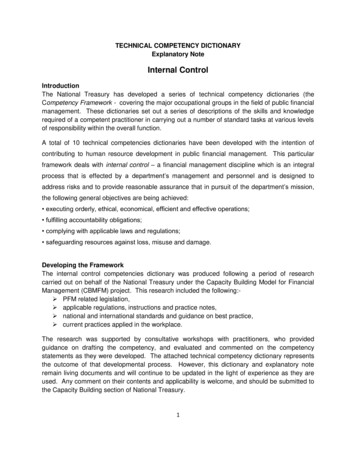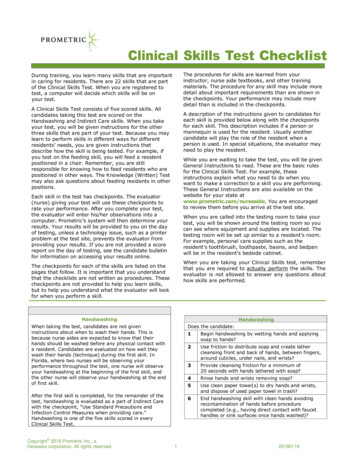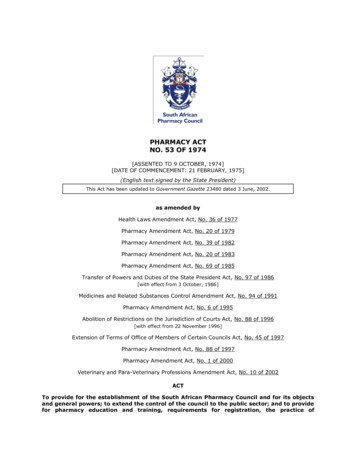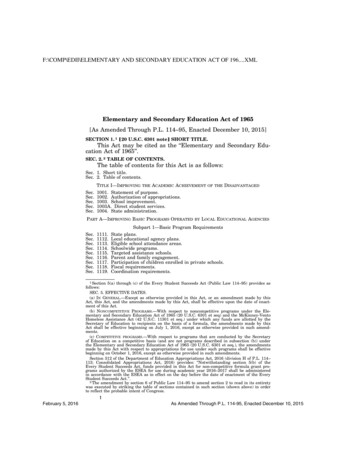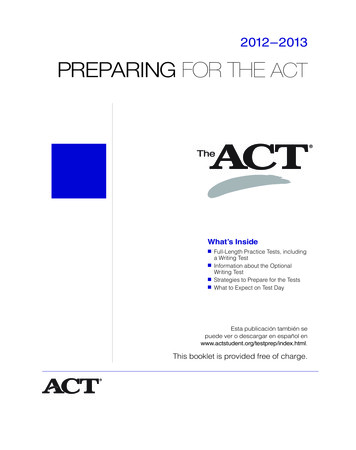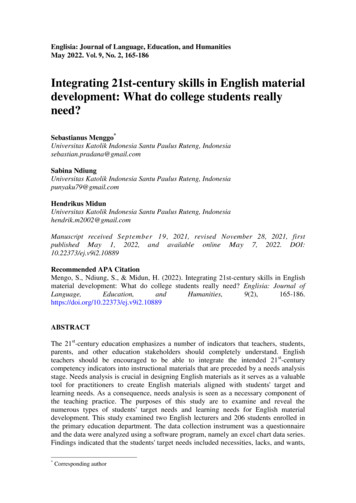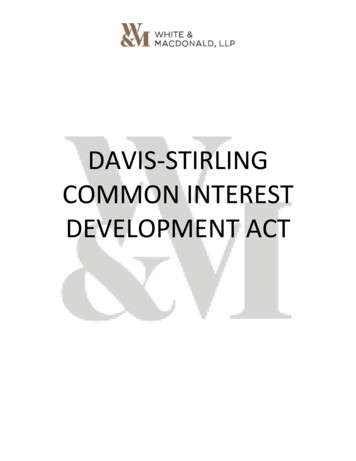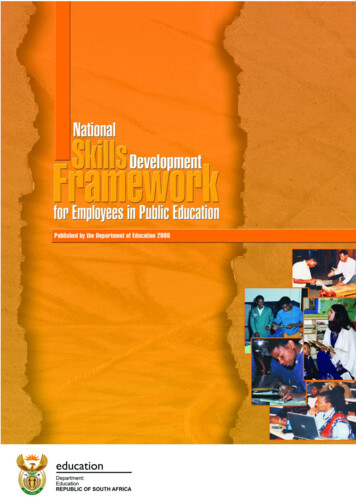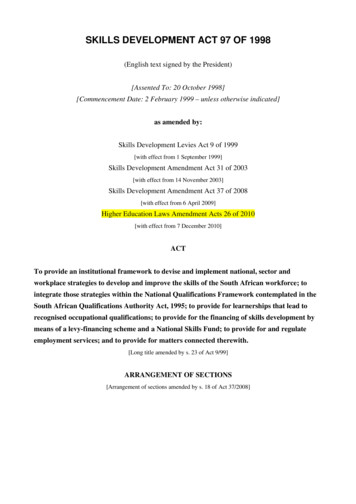
Transcription
SKILLS DEVELOPMENT ACT 97 OF 1998(English text signed by the President)[Assented To: 20 October 1998][Commencement Date: 2 February 1999 – unless otherwise indicated]as amended by:Skills Development Levies Act 9 of 1999[with effect from 1 September 1999]Skills Development Amendment Act 31 of 2003[with effect from 14 November 2003]Skills Development Amendment Act 37 of 2008[with effect from 6 April 2009]Higher Education Laws Amendment Acts 26 of 2010[with effect from 7 December 2010]ACTTo provide an institutional framework to devise and implement national, sector andworkplace strategies to develop and improve the skills of the South African workforce; tointegrate those strategies within the National Qualifications Framework contemplated in theSouth African Qualifications Authority Act, 1995; to provide for learnerships that lead torecognised occupational qualifications; to provide for the financing of skills development bymeans of a levy-financing scheme and a National Skills Fund; to provide for and regulateemployment services; and to provide for matters connected therewith.[Long title amended by s. 23 of Act 9/99]ARRANGEMENT OF SECTIONS[Arrangement of sections amended by s. 18 of Act 37/2008]
CHAPTER 1DEFINITIONS, PURPOSE AND INTERPRETATION OF ACT1.Definitions2.Purposes of Act3.InterpretationCHAPTER 2NATIONAL SKILLS AUTHORITY4.Establishment of National Skills Authority5.Functions of National Skills Authority6.Composition of National Skills Authority and term and vacation of office7.Constitution of National Skills Authority8.Remuneration and administration of National Skills AuthorityCHAPTER 3SECTOR EDUCATION AND TRAINING AUTHORITIES9.Establishment of SETA9A.Amalgamation and dissolution of SETAs10.Functions of SETA10A. SETAs to conclude service level agreements11.Composition of SETA12.Chambers of SETA13.Constitution of SETA14.Finances of SETA14A. Minister may issue written instructions to SETAs15.Taking over administration of SETACHAPTER 4LEARNERSHIPS16.Learnerships17.Learnership agreements18.Contract of employment with learner19.Disputes about learnerships
CHAPTER 5SKILLS PROGRAMMES20.Skills programmes21.DisputesCHAPTER 6INSTITUTION IN DEPARTMENT OF LABOUR AND EMPLOYMENT SERVICES22.Administration of Act by Department23.Employment services24.Registration of persons that provide employment services25.Cancellation of registration of private employment services agency26.Appeal against Director-General’s decisionCHAPTER 6AARTISAN DEVELOPMENT26A. National artisan moderation body26B. Listing of trades26C. National register of artisans26D. Trade testsCHAPTER 6BSKILLS DEVELOPMENT INSTITUTES26E. Skills development institutesCHAPTER 6CQUALITY COUNCIL FOR TRADES AND OCCUPATIONS26F. Policy on occupational standards and qualifications26G. Establishment of QCTO26H. Functions of QCTO26I. Delegation of functions26J. Regulations regarding occupational standards and qualifications
CHAPTER 6DWORKPLACE PRODUCTIVITY AND COMPETITIVENESS26K. Establishment of Productivity South Africa26L. Functions of Productivity South Africa26M. Finances of Productivity South Africa26N. Regulations regarding workplace productivity and competitivenessCHAPTER 7FINANCING SKILLS DEVELOPMENT27.National Skills Fund28.Use of money in Fund29.Control and administration of Fund30.Budget for training by public service employers30A. Budget for training by national and provincial public entities30B. National standard of good practice in skills developmentCHAPTER 8GENERAL31.Jurisdiction of Labour Court32.Monitoring, enforcement and legal Regulations37.Repeal of laws and transitional provisions38.Act binds State39.Short title and commencementSchedule 1 -Repeal of lawsSchedule 2 -Transitional provisionsSchedule 2A - Transitional Provisions: Skills Development Amendment Act, 2008Schedule 3 -Composition and constitution of QCTOSchedule 4 -Composition and constitution of Productivity South Africa
CHAPTER 1DEFINITIONS, PURPOSE AND APPLICATION OF ACT1.DefinitionsIn this Act, unless the context otherwise indicates –“apprenticeship” means a learnership in respect of a listed trade, and includes a trade-test inrespect of that trade;[Definition of “apprenticeship” inserted by s. 1 of Act 37/2008]“artisan” means a person that has been certified as competent to perform a listed trade inaccordance with this Act;[Definition of “artisan” inserted by s. 1 of Act 37/2008]“Basic Conditions of Employment Act” means the Basic Conditions of Employment Act,1997 (Act No. 75 of 1997);“Department” means the Department of Higher Education and Training, except in(a)sections 2(1)(g) and (h), 2(2)(a)(v), (vi) and (xii), 5(4) (only with respect to ProductivitySouth Africa established by section 26K), 22(1), 23(1)(a) and (d), (2) and (3), 24, 25,26, 26K, 26L, 26M, 26N, 32(2), 36(o), (p) and (q), item 7 of Schedule 2A and Schedule4; and(b)sections 32(1), 33 and 36(a) and (s) and any other provision to the extent that theseprovisions apply to “employment services” defined in section 1 or to Productivity SouthAfrica established by section 26K, but excluding section 23(l)(b) and (c),where it means the Department of Labour;[Definition of “Department” substituted by s. 4 of Act 26/2010]“designated groups” means black people, women and people with disabilities;[Definition of “designated groups” inserted by s. 1 of Act 31/2003]“Director-General” means the Director-General of Higher Education and Training;
[Definition of “Director-General” substituted by s. 4 of Act 26/2010]“employee” means –(a)any person, excluding an independent contractor, who works for another person or forthe State and who receives, or is entitled to receive, any remuneration; or(b)any other person who in any manner assists in carrying on or conducting the business ofan employer, and “employed” and “employment” have corresponding meanings;“employment services” means the provision of the service of –(a)advising or counselling of workers on career choices either by the provision ofinformation or other approaches;(b)(c)(d)assessment of work-seekers for –(i)entry or re-entry into the labour market; or(ii)education and training;the reference of work-seekers –(i)to employers to apply for vacancies; or(ii)to training providers for education and training;assistance of employers by –(i)providing recruitment and placement services;(ii)advising them on the availability of work-seekers with skills that match theirneeds;(iii)advising them on the retrenchment of employees and the development of socialplans;
(dA) procuring for or providing to a client other persons to render services to or performwork for the client, irrespective of by whom those persons are remunerated; or[Para. (dA) inserted by s. 1 of Act 31/2003](e)any other prescribed employment service;“government department” means any department or organisational component referred to inSchedule 1 or 2 of the Public Service Act, 1994 (Proclamation No. 103 of 1994);“Labour Court” means the Labour Court established by section 151 of the Labour RelationsAct, 1995 (Act No. 66 of 1995);“learner” includes an apprentice;[Definition of “learner” by s. 1 of Act 37/2008]“learnership” includes an apprenticeship;[Definition of “learnership” inserted by s. 1 of Act 37/2008]“learning” means the acquisition of knowledge, understanding, values, skill, competence orexperience;[Definition of “learning” inserted by s. 1 of Act 37/2008]“learning programme” includes a learnership, an apprenticeship, a skills programme andany other prescribed learning programme which includes a structured work experiencecomponent;[Definition of “learning programme” inserted by s. 1 of Act 37/2008]“Minister” means the Minister of Higher Education and Training, except in(a)sections 2(1)(g) and (h), 2(2)(a)(v), (vi) and (xii), 5(4) (only with respect to ProductivitySouth Africa established by section 26K), 22(1), 23(1)(a) and (d), (2) and (3), 24, 25,26, 26K, 26L, 26M, 26N, 32(2), 36(o), (p) and (q), item 7 of Schedule 2A and Schedule4; and(b)sections 32(1), 33 and 36(a) and (s) and any other provision to the extent that theseprovisions apply to “employment services” defined in section 1 or to Productivity SouthAfrica established by section 26K, but excluding section 23(1)(b) and (c),
where it means the Minister of Labour;[Definition of “Minister” substituted by s. 4 of Act 26/2010]“National Qualifications Framework” means the National Qualifications Frameworkcontemplated by the National Qualifications Framework Act, 2008;[Definition of “National Qualifications Framework” inserted by s. 1 of Act 37/2008]“National Skills Authority” means the National Skills Authority established by section 4;“national skills development policy” means the national skills development policy referredto in section 5(1)(a)(i);“national skills development strategy” means the national skills development strategyreferred to in section 5(1)(a)(ii);“National Skills Fund” means the National Skills Fund established by section 27;“NEDLAC” means the National Economic Development and Labour Council established bysection 2 of the National Economic Development and Labour Council Act, 1994 (Act No. 35of 1994);“occupational qualification” means a qualification associated with a trade, occupation orprofession resulting from work-based learning and consisting of knowledge unit standards,practical unit standards and work experience unit standards;[Definition of “occupational qualification” inserted by s. 1 of Act 37/2008]“Occupational Qualifications Framework” means the sub-framework for occupationalqualifications which forms an integral part of the National Qualifications Framework;[Definition of “Occupational Qualifications Framework” inserted by s. 1 of Act 37/2008]“placement” means placing an individual in a placement opportunity, with due regard to theCode of Good Practice on the Integration of Employment Equity in Human ResourcesPolicies and Practices in terms of the Employment Equity Act, 1998 (Act No. 55 of 1998);[Definition of “placement” inserted by s. 1 of Act 37/2008]
“placement opportunity” means any opportunity for work or learning that could be offeredto an individual and includes a vacancy for employment, an opportunity for self-employment,a learning programme and community service;[Definition of “placement opportunity” inserted by s. 1 of Act 37/2008]“prescribed” means prescribed by regulation;“private employment services agency” means any person that provides employmentservices for gain;[Definition of “private employment services agency” inserted by s. 1 of Act 31/2003]“Public Finance Management Act” means the Public Finance Management Act, 1999 (ActNo. 1 of 1999);[Definition of “Public Finance Management Act” inserted by s. 1 of Act 31/2003]“QCTO” means the Quality Council for Trades and Occupations established in terms ofsection 26G;[Definition of “QCTO” inserted by s. 1 of Act 37/2008]“regulation” means a regulation made and in force in terms of this Act;[Definition of “regulation” substituted by s. 1 of Act 31/2003]“repealed Act” means(i)the Manpower Training Act, 1981 (Act No. 56 of 1981);(ii)any law repealed by the Manpower Training Act, 1981, and any law repealed by suchan Act; and(iii)any law listed in Schedule 1 to the Integration of Labour Laws Act, 1994 (Act No. 49of 1994), dealing with training or skills development;[Definition of “repealed Act” inserted by s. 1 of Act 37/2008]“service level agreement” means a service level agreement concluded in terms of section10A;[Definition of “service level agreement” inserted by s. 1 of Act 31/2003]
“SETA” means a sector education and training authority established in terms of section 9(1);“Skills Development Levies Act” means the Skills Development Levies Act, 1999;[Definition of “Skills Development Levies Act” substituted by s. 23 of Act 9/99]“skills development levies” means a levy as defined in section 1 of the Skills DevelopmentLevies Act;[Definition of “skills development levies” substituted by s. 23 of Act 9/99]“skills development provider” means a provider of an occupational learning; and[Definition of “skills development provider” inserted by s. 1 of Act 37/2008]“South African Qualifications Authority” means the South African Qualification Authorityestablished by section 3 of the South African Qualifications Authority Act;“South African Qualifications Authority Act” means the South Africa QualificationsAuthority Act, 1995 (Act No. 58 of 1995);“this Act” includes any regulations but does not include the footnotes; and“trade” means an occupation for which an artisan qualification is required in terms of section26B;[Definition of “trade” inserted by s. 1 of Act 37/2008]“worker” includes an employee, an unemployed person and a work-seeker.2.Purposes of Act(1)The purposes of this Act are (a)to develop the skills of the South African workforce (i)to improve the quality of life of workers, their prospects of work and labourmobility;(ii)to improve productivity in the workplace and the competitiveness ofemployers;
(b)(iii)to promote self-employment; and(iv)to improve the delivery of social services;to increase the levels of investment in education and training in the labour marketand to improve the return on that investment;(c)to encourage employers (i)to use the workplace as an active learning environment;(ii)to provide employees with the opportunities to acquire new skills;(iii)to provide opportunities for new entrants to the labour market to gain workexperience; and(iv)(d)to employ persons who find it difficult to be employed;to encourage workers to participate in learning programmes;[Para. (d) substituted by s. 2 of Act 37/2008](e)to improve the employment prospects of persons previously disadvantaged byunfair discrimination and to redress those disadvantages through training andeducation;(f)to ensure the quality of learning in and for the workplace;[Para. (f) substituted by s. 2 of Act 37/2008](g)to assist (i)work-seekers to find work;(ii)retrenched workers to re-enter the labour market;(iii)employers to find qualified employees; and
(h)(2)to provide and regulate employment services.Those purposes are to be achieved through(a)an institutional and financial framework comprising(i)the National Skills Authority;(ii)the National Skills Fund;(iii)a skills development levy-financing scheme as contemplated in the SkillsDevelopment Levies Act;(iv)SETAs;(v)provincial offices of the Department;(vi)labour centres of the Department;(vii) accredited trade test centres;(viii) skills development institutes;(b)(ix)the Quality Council for Trades and Occupations;(x)a skills development forum for each province;(xi)a national artisan moderation body; and(xii)Productivity South Africa;encouraging partnerships between the public and private sectors of the economyto provide learning in and for the workplace; and(c)co-operating with the South African Qualifications Authority.[Subs. (2) amended by s. 23 of Act 9/99 and substituted by s. 2 of Act 37/2008]
3.InterpretationAny person applying this Act must interpret its provisions to give effect to (a)its purposes; and(b)the objects of the South African Qualifications Authority Act.CHAPTER 2NATIONAL SKILLS AUTHORITY4.Establishment of National Skills AuthorityThe National Skills Authority is hereby established.5.Functions of National Skills Authority(1)The functions of the National Skills Authority are(a)to advise the Minister on(i)a national skills development policy;(ii)a national skills development strategy;(iii)guidelines on the implementation of the national skills developmentstrategy;(iv)the strategic framework and criteria for allocation of funds from theNational Skills Fund; and(v)(b)any regulations to be made;to liaise with SETAs on(i)the national skills development policy;
(c)(ii)the national skills development strategy; and(iii)sector skills plans;to report to the Minister on the progress made in the implementation of thenational skills development strategy;(d)to conduct investigations on any matter arising out of the application of this Act;(dA) to liaise with the QCTO on occupational standards and qualifications; and(e)to exercise any other powers and perform any other duties conferred or imposedon the Authority by this Act.[Subs. (1) amended by s. 2 of Act 31/2003 and substituted by s. 3 of Act 37/2008](2)For the purposes of investigations referred to in subsection (1)(d), the Authority has theprescribed powers of entry and to question and inspect.(3)The Authority must perform its functions in accordance with this Act and itsconstitution.(4)Subsection (1)(a)(iv) does not apply to regulations in respect of which the Minister isrequired to consult with the QCTO or Productivity South Africa.[Subs. (4) added by s. 3 of Act 37/2008]6.Composition of National Skills Authority and term and vacation of office(1)The National Skills Authority consists of (a)a voting chairperson appointed by the Minister;(b)24 voting and six non-voting members appointed by the Minister; and[Para. (b) substituted by s. 3 of Act 31/2003 and s. 4 of Act 37/2008](c)(2)its non-voting executive officer appointed in terms of section 8(2)(a).The members referred to in subsection (1)(b) are -
(a)five voting members nominated by NEDLAC and appointed by the Minister torepresent organised labour;(b)five voting members nominated by NEDLAC and appointed by the Minister torepresent organised business;(c)five voting members nominated by NEDLAC and appointed by the Minister torepresent organisations of community and development interests, which mustinclude -(d)(i)a woman who represents the interests of women;(ii)a person who represents the interests of the youth; and(iii)a disabled person who represents the interests of people with disabilities;five voting members appointed by the Minister to represent the interests of theState;(e)four voting members appointed by the Minister to represent the interests ofeducation and skills development providers;[Para. (e) substituted by s. 4 of Act 37/2008](eA) two non-voting members, who have expertise in skills development, appointed bythe Minister after consultation with the National Skills Authority;[Para. (eA) inserted by s. 3 of Act 31/2003](f)two non-voting members, who have expertise in the provision of employmentservices, appointed by the Minister;[Para. (f) substituted by s. 4 of Act 37/2008](g)a non-voting member nominated by the South African Qualifications Authorityand appointed by the Minister;[Para. (g) substituted by s. 4 of Act 37/2008](h)a non-voting member nominated by the QCTO and appointed by the Minister.
[Para. (h) added by s. 4 of Act 37/2008](3)The Minister must designate five members as deputy chairpersons, one deputychairperson each from the members to be appointed to represent (a)organised labour;(b)organised business;(c)organisations of community and development interests;(d)the interests of the State; and(e)education and skills development providers.[Subs. (3) substituted by s. 4 of Act 37/2008](4)A member of the Authority holds office for a period of five years and is eligible for reappointment on expiry of his or her term of office, but may not serve more than twoconsecutive terms of office.[Subs. (4) substituted by s. 4 of Act 37/2008](5)(6)A member of the Authority vacates office if that member (a)is removed from office by the Minister as contemplated in subsection (6); or(b)resigns by written notice addressed to the Minister.The Minister may remove a member of the Authority (a)on the written request of the body that nominated that member in terms ofsubsection (2);(b)for serious misconduct;(c)for permanent incapacity;(d)for absence from three consecutive meetings of the Authority -
(e)(7)(i)without the prior permission of the Authority; or(ii)unless the member shows good cause; orfor engaging in any activity that may undermine the functions of the Authority.If the chairperson or a member of the Authority vacates office before the expiry of theperiod of office, the Minister must, in terms of subsection (1)(a) or (2), respectively,appoint a new chairperson or member, as the case may be, for the unexpired portion ofthat period within 90 days.[Subs. (7) substituted by s. 4 of Act 37/2008]7.Constitution of National Skills Authority(1)The National Skills Authority must, as soon as possible after the appointment of itsmembers, adopt its constitution.(2)Subject to this Act, the constitution of the Authority (a)must provide for (i)procedures for the nominations of members of the Authority referred to insection 6(2)(a), (b), (c) and (g);(ii)the establishment and functioning of committees, including an executivecommittee;(iii)subject to subsection (3), the rules for convening and conducting ofmeetings of the Authority and its committees, including the quorumrequired for and the minutes to be kept of those meetings;(iv)the voting rights of the different members and the manner in whichdecisions are to be taken by the Authority and its committees;(v)a code of conduct for the members of the Authority;
(vi)the determination through arbitration of any dispute concerning theinterpretation or application of the constitution; and(vii)subject to subsections (4) and (5), a procedure for amending theconstitution and advising the Minister on regulations to be made; and(b)may provide for (i)the delegation of powers and duties of the Authority to its members,committees and employees, provided that the Authority may imposeconditions for the delegation, may not be divested of any power or duty byvirtue of the delegation and may vary or set aside any decision made underany delegation; and(ii)any other matter necessary for the performance of the functions of theAuthority.(3)At least 30 days notice must be given for a meeting of the Authority at which anamendment of the constitution or a regulation to be made is to be considered.(4)A supporting vote of at least two thirds of the Authority’s members and the approval ofthe Minister is required for an amendment to its constitution.(5)A supporting vote of at least two-thirds of the Authority’s members is required foradvising the Minister on regulations to be made.(6)Despite subsection (2)(a)(i), the Minister must determine the procedure for thenominations for the first appointment of members of the Authority referred to in section6(2)(a), (b), (c) and (g).8.Remuneration and administration of National Skills Authority(1)A member of the National Skills Authority who is not in the full-time employment ofthe State may be paid the remuneration and allowances determined by the Minister withthe approval of the Minister of Finance.(2)Subject to the laws governing the public service, the Director-General must -
(a)appoint a person to be the executive officer of the National Skills Authority whowill, upon such appointment, be in the employ of the public service; and(b)provide the Authority with the personnel and financial resources that the Ministerconsiders necessary for the performance of its functions.CHAPTER 3SECTOR EDUCATION AND TRAINING AUTHORITIES9.Establishment of SETA(1)The Minister may, in the prescribed manner, establish a sector education and trainingauthority with a constitution for any national economic sector.(2)The Minister must determine a discrete sector for the purposes of subsection (1) byreference to categories of employers and for the purposes of that determination take intoaccount (a)(b)the education and training needs of employers and employees that (i)use similar materials, processes and technologies;(ii)make similar products; or(iii)render similar services;the potential of the proposed sector for coherent occupational structures andcareer pathing;(c)the scope of any national strategies for economic growth and development;(d)the organisational structures of the trade unions, employer organisations andgovernment in closely related sectors;
(e)any consensus that there may be between organised labour, organised employersand relevant government departments as to the definition of any sector; and(f)(3)the financial and organisational ability of the proposed sector to support a SETA.On the establishment of a SETA, the Minister may provide assistance to the SETA toenable it to perform its functions.(4)The Minister may, after consulting the National Skills Authority and the SETAs inquestion and subject to subsection (2), change the sector of a SETA and must publish anotice in the Gazette reflecting such change.[Subs. (4) added by s. 4 of Act 31/2003](Commencement date of s. 9: 10 September 1999)9A.Amalgamation and dissolution of SETAs(1)The Minister may, after consulting the National Skills Authority and the SETAs inquestion and subject to section 9(2), amalgamate two or more SETAs.(2)The Minister must approve a constitution for the amalgamated SETA.(3)The Minister must publish a notice in the Gazette containing-(4)(a)the date of the amalgamation;(b)the sector for which the amalgamated SETA is established; and(c)any other matter necessary to prescribe in order to establish the amalgamation.On the establishment of the amalgamated SETA, all assets, rights, liabilities andobligations of the amalgamating SETAs devolve upon and vest in the amalgamatedSETA.(5)The Minister may, after consulting the National Skills Authority and the SETA inquestion, dissolve a SETA if the SETA is unable to continue to perform its functions.(6)The Minister must publish a notice in the Gazette-
(a)containing the date of the dissolution of the SETA;(b)setting out the manner in which, and by whom, the SETA is to be wound-up;(c)setting out how any assets remaining after the winding-up of the SETA must bedistributed; and(d)providing for any other matter necessary for the dissolution and winding-up of theSETA in question.(7)No transfer duty, stamp duty, fee or costs are payable in respect of the transfer of anyassets, rights, liabilities or obligations between SETAs as contemplated in this section.(8)The Registrar of Deeds on presentation of proof of any transfer of immovable propertycontemplated in this section must endorse the title deeds accordingly and make theentries in the relevant register that are necessary to register the transfer.[S. 9A inserted by s. 5 of Act 31/2003]10.Functions of SETA(1)A SETA must, in accordance with any requirements that may be prescribed(a)develop a sector skills plan within the framework of the national skillsdevelopment strategy;(b)implement its sector skills plan by(i)establishing learning programmes;(ii)approving workplace skills plans and annual training reports;(iii)allocating grants in the prescribed manner and in accordance with anyprescribed standards and criteria to employers, education and skillsdevelopment providers and workers; and(iv)monitoring education and skills development provision in the sector;
(c)promote learning programmes by(i)identifying workplaces for practical work experience;(ii)supporting the development of learning materials;(iii)improving the facilitation of learning; and(iv)assisting in the conclusion of agreements for learning programmes, to theextent that it is required;(d)register agreements for learning programmes, to the extent that it is required;(e)perform any functions delegated to it by the QCTO in terms of section 26I;(f)when required to do so as contemplated in section 7(1) of the Skills DevelopmentLevies Act, collect the skills development levies, and must disburse the levies,allocated to it in terms of sections 8(3)(b) and 9(b), in its sector;(g)(h)liaise with the National Skills Authority on(i)the national skills development policy;(ii)the national skills development strategy; and(iii)its sector skills plan;submit to the Director-General(i)any budgets, reports and financial statements on its income and expenditurethat it is required to prepare in terms of the Public Finance ManagementAct; and(ii)strategic plans and reports on the implementation of its service levelagreement;
(i)liaise with the provincial offices and labour centres of the Department and anyeducation body established under any law regulating education in the Republic toimprove information(i)about placement opportunities; and(ii)between education and skills development providers and the labour market;(iA) liaise with the skills development forums established in each province in suchmanner and on such issues as may be prescribed;(j)subject to section 14, appoint staff necessary for the performance of its functions;(jA) promote the national standard established in terms of section 30B;(jB) liaise with the QCTO regarding occupational qualifications; and(k)perform any other duties imposed by this Act or the Skills Development LeviesAct or consistent with the purposes of this Act.[Subs. (1) amended by s. 23 of Act 9/99 and s. 6 of Act 31/2003 and substituted by s. 5 of Act 37/2008](2)A SETA has (a)all such powers as are necessary to enable it to perform its duties referred to insubsection (1); and(b)the other powers conferred on the SETA by this Act or the Skills DevelopmentLevies Act.[Para. (b) substituted by s. 23 of Act 9/99](3)A SETA must perform its functions in accordance with this Act, the Skills DevelopmentLevies Act and its constitution.[Subs. (3) substituted by s. 23 of Act 9/99](Commencement date of s. 10: 10 September 1999)
10A. SETAs to conclude service level agreements(1)For each financial year, every SETA must conclude with the Director-General a servicelevel agreement concerning(a)the SETA’s performance of its functions in terms of this Act and the nationalskills development strategy;(b)the SETA’s annual business plan; and(c)any assistance that the Director-General is to provide to the SETA in order toenable it to perform its functions.(2)If the Director-General and a SETA cannot agree on the contents of a service levelagreement within the prescribed period, the Minister must determine the contents of theservice level agreement after con
National standard of good practice in skills development CHAPTER 8 GENERAL 31. Jurisdiction of Labour Court 32. Monitoring, enforcement and legal proceedings 33. Offences 34. Penalties 35. Delegation 36. Regulations 37. Repeal of laws and transitional provisions 38. Act binds State 39. Short title and commencement Schedule 1 - Repeal of laws Schedule 2 - Transitional provisions Schedule 2A .
